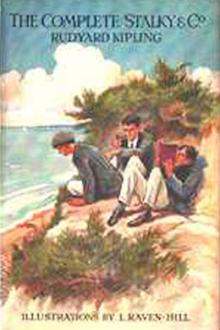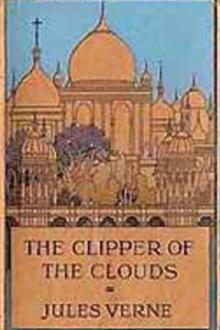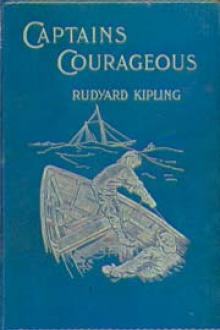Kim, Rudyard Kipling [best romance ebooks TXT] 📗

- Author: Rudyard Kipling
Book online «Kim, Rudyard Kipling [best romance ebooks TXT] 📗». Author Rudyard Kipling
“Look! Is it coming into shape?” asked Lurgan Sahib.
“But it is smashed—smashed,” he gasped—Lurgan Sahib had been muttering softly for the last half-minute. Kim wrenched his head aside. “Look! Dekho! It is there as it was there.”
“It is there as it was there,” said Lurgan, watching Kim closely while the boy rubbed his neck. “But you are the first of many who has ever seen it so.” He wiped his broad forehead.
“Was that more magic?” Kim asked suspiciously. The tingle had gone from his veins; he felt unusually wide awake.
“No, that was not magic. It was only to see if there was—a flaw in a jewel. Sometimes very fine jewels will fly all to pieces if a man holds them in his hand, and knows the proper way. That is why one must be careful before one sets them. Tell me, did you see the shape of the pot?”
“For a little time. It began to grow like a flower from the ground.”
“And then what did you do? I mean, how did you think?”
“Oah! I knew it was broken, and so, I think, that was what I thought—and it was broken.”
“Hm! Has anyone ever done that same sort of magic to you before?”
“If it was,” said Kim “do you think I should let it again? I should run away.”
“And now you are not afraid—eh?”
“Not now.”
Lurgan Sahib looked at him more closely than ever. “I shall ask Mahbub Ali—not now, but some day later,” he muttered. “I am pleased with you—yes; and I am pleased with you—no. You are the first that ever saved himself. I wish I knew what it was that ... But you are right. You should not tell that—not even to me.”
He turned into the dusky gloom of the shop, and sat down at the table, rubbing his hands softly. A small, husky sob came from behind a pile of carpets. It was the Hindu child obediently facing towards the wall. His thin shoulders worked with grief.
“Ah! He is jealous, so jealous. I wonder if he will try to poison me again in my breakfast, and make me cook it twice.
“Kubbee—kubbee nahin,” came the broken answer.
“And whether he will kill this other boy?”
“Kubbee—kubbee nahin.” (Never—never. No!)
“What do you think he will do?” He turned suddenly on Kim.
“Oah! I do not know. Let him go, perhaps. Why did he want to poison you?”
“Because he is so fond of me. Suppose you were fond of someone, and you saw someone come, and the man you were fond of was more pleased with him than he was with you, what would you do?”
Kim thought. Lurgan repeated the sentence slowly in the vernacular.
“I should not poison that man,” said Kim reflectively, “but I should beat that boy—if that boy was fond of my man. But first, I would ask that boy if it were true.”
“Ah! He thinks everyone must be fond of me.”
“Then I think he is a fool.”
“Hearest thou?” said Lurgan Sahib to the shaking shoulders. “The Sahib’s son thinks thou art a little fool. Come out, and next time thy heart is troubled, do not try white arsenic quite so openly. Surely the Devil Dasim was lord of our table-cloth that day! It might have made me ill, child, and then a stranger would have guarded the jewels. Come!”
The child, heavy-eyed with much weeping, crept out from behind the bale and flung himself passionately at Lurgan Sahib’s feet, with an extravagance of remorse that impressed even Kim.
“I will look into the ink-pools—I will faithfully guard the jewels! Oh, my Father and my Mother, send him away!” He indicated Kim with a backward jerk of his bare heel.
“Not yet—not yet. In a little while he will go away again. But now he is at school—at a new madrissah—and thou shalt be his teacher. Play the Play of the Jewels against him. I will keep tally.”
The child dried his tears at once, and dashed to the back of the shop, whence he returned with a copper tray.
“Give me!” he said to Lurgan Sahib. “Let them come from thy hand, for he may say that I knew them before.”
“Gently—gently,” the man replied, and from a drawer under the table dealt a half-handful of clattering trifles into the tray.
“Now,” said the child, waving an old newspaper. “Look on them as long as thou wilt, stranger. Count and, if need be, handle. One look is enough for me.” He turned his back proudly.
“But what is the game?”
“When thou hast counted and handled and art sure that thou canst remember them all, I cover them with this paper, and thou must tell over the tally to Lurgan Sahib. I will write mine.”
“Oah!” The instinct of competition waked in his breast. He bent over the tray. There were but fifteen stones on it. “That is easy,” he said after a minute. The child slipped the paper over the winking jewels and scribbled in a native account-book.
“There are under that paper five blue stones—one big, one smaller, and three small,” said Kim, all in haste. “There are four green stones, and one with a hole in it; there is one yellow stone that I can see through, and one like a pipe-stem. There are two red stones, and—and—I made the count fifteen, but two I have forgotten. No! Give me time. One was of ivory, little and brownish; and—and—give me time...”
“One—two”—Lurgan Sahib counted him out up to ten. Kim shook his head.
“Hear my count!” the child burst in, trilling with laughter. “First, are two flawed sapphires—one of two ruttees and one of four as I should judge. The four-ruttee sapphire is chipped at the edge. There is one Turkestan turquoise, plain with black veins, and there are two inscribed—one with a Name of God in gilt, and the other being cracked across, for it came out of an old ring, I cannot read. We have now all five blue stones. Four flawed emeralds there are, but one is drilled in two places, and one is a little carven—”
“Their weights?” said Lurgan Sahib impassively.
“Three—five—five—and four ruttees as I judge it. There is one piece of old greenish pipe amber, and a cut topaz from Europe. There is one ruby of Burma, of two ruttees, without a flaw, and there is a balas-ruby, flawed, of two ruttees. There is a carved ivory from China representing a rat sucking an egg; and there is last—ah ha!—a ball of crystal as big as a bean set on a gold leaf.”
He clapped his hands at the close.
“He is thy master,” said Lurgan Sahib, smiling.
“Huh! He knew the names of the stones,” said Kim, flushing. “Try again! With common things such as he and I both know.”
They heaped the tray again with odds and ends gathered from the shop, and even the kitchen, and every time the child won, till Kim marvelled.
“Bind my eyes—let me feel once with my fingers, and even then I will leave thee opened-eyed behind,” he challenged.
Kim stamped with vexation when the lad made his boast good.
“If it were men—or horses,” he said, “I could do better. This playing with tweezers and knives and scissors is too little.”
“Learn first—teach later,” said Lurgan Sahib. “Is he thy master?”
“Truly. But how is it done?”
“By doing it many times over till it is done perfectly—for it is worth doing.”
The Hindu boy, in highest feather, actually patted Kim on the back.
“Do not despair,” he said. “I myself will teach thee.”
“And I will see that thou art well taught,” said Lurgan Sahib, still speaking in the vernacular, “for except my boy here—it was foolish of him to buy so much white arsenic when, if he had asked, I could have given it—except my boy here I have not in a long time met with one better worth teaching. And there are ten days more ere thou canst return to Lucknao where they teach nothing—at the long price. We shall, I think, be friends.”
They were a most mad ten days, but Kim enjoyed himself too much to reflect on their craziness. In the morning they played the Jewel Game—sometimes with veritable stones, sometimes with piles of swords and daggers, sometimes with photo-graphs of natives. Through the afternoons he and the Hindu boy would mount guard in the shop, sitting dumb behind a carpet-bale or a screen and watching Mr Lurgan’s many and very curious visitors. There were small Rajahs, escorts coughing in the veranda, who came to buy curiosities—such as phonographs and mechanical toys. There were ladies in search of necklaces, and men, it seemed to Kim—but his mind may have been vitiated by early training—in search of the ladies; natives from independent and feudatory Courts whose ostensible business was the repair of broken necklaces—rivers of light poured out upon the table—but whose true end seemed to be to raise money for angry Maharanees or young Rajahs. There were Babus to whom Lurgan Sahib talked with austerity and authority, but at the end of each interview he gave them money in coined silver and currency notes. There were occasional gatherings of long-coated theatrical natives who discussed metaphysics in English and Bengali, to Mr Lurgan’s great edification. He was always interested in religions. At the end of the day, Kim and the Hindu boy—whose name varied at Lurgan’s pleasure—were expected to give a detailed account of all that they had seen and heard—their view of each man’s character, as shown in his face, talk, and manner, and their notions of his real errand. After dinner, Lurgan Sahib’s fancy turned more to what might be called dressing-up, in which game he took a most informing interest. He could paint faces to a marvel; with a brush-dab here and a line there changing them past recognition. The shop was full of all manner of dresses and turbans, and Kim was apparelled variously as a young Mohammedan of good family, an oilman, and once—which was a joyous evening—as the son of an Oudh landholder in the fullest of full dress. Lurgan Sahib had a hawk’s eye to detect the least flaw in the make-up; and lying on a worn teak-wood couch, would explain by the half-hour together how such and such a caste talked, or walked, or coughed, or spat, or sneezed, and, since “hows” matter little in this world, the “why” of everything. The Hindu child played this game clumsily. That little mind, keen as an icicle where tally of jewels was concerned, could not temper itself to enter another’s soul; but a demon in Kim woke up and sang with joy as he put on the changing dresses, and changed speech and gesture therewith.
Carried away by enthusiasm, he volunteered to show Lurgan Sahib one evening how the disciples of a certain caste of faquir, old Lahore acquaintances, begged doles by the roadside; and what sort of language he would use to an Englishman, to a Punjabi farmer going to a fair, and to a woman without a veil. Lurgan Sahib laughed immensely, and begged Kim to stay as he was, immobile for half an hour—cross-legged, ash-smeared, and wild-eyed, in the back room. At the end of that time entered a hulking, obese Babu whose stockinged legs shook with fat, and Kim opened on him with a shower of wayside chaff. Lurgan Sahib—this annoyed Kim—watched the Babu and not the play.
“I think,” said the Babu heavily, lighting a cigarette, “I am of opeenion that it is most extraordinary and effeecient performance. Except that you had told me I should have opined that—that—that you were pulling my legs. How soon can he become approximately effeecient chain-man? Because then I shall indent for him.”
“That is what he must learn at Lucknow.”
“Then order him to be jolly-dam’-quick. Good-night, Lurgan.” The Babu swung out with the gait of a bogged cow.
When they were telling over the day’s list of visitors, Lurgan Sahib asked Kim who he thought the man might be.
“God knows!” said Kim cheerily. The tone might almost have deceived Mahbub Ali, but it failed entirely with the healer of sick pearls.
“That is true. God, He knows; but I wish to know what you think.”
Kim glanced sideways at his companion, whose eye had a way of compelling truth.
“I—I think he will want me when I come from the school, but”—confidentially, as Lurgan Sahib nodded approval—“I do not understand how he can wear many dresses and talk many tongues.”
“Thou wilt understand many things later. He is a writer of tales for a certain Colonel. His honour is great only in Simla, and it is noticeable that he has no name, but only a number and a letter—that is a custom among us.”
“And is there a price upon his head too—as upon Mah—all the others?”
“Not yet; but if a boy rose up who is now sitting here and went—look, the door is open!—as far as a certain





Comments (0)